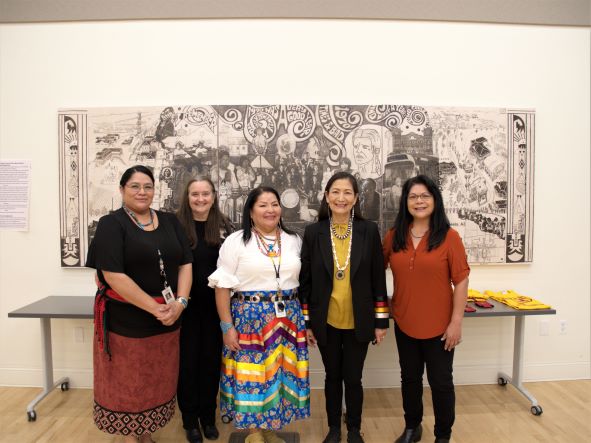apartmentApply to Osborn Pointe! Learn more about this 55+ community in Phoenix - NOW LEASING!

NAC welcomed Sec. Haaland on her visit last Thursday.
U.S. Department of Interior Secretary Deb Haaland visited the former Phoenix Indian School (1891-1990) on Thursday afternoon, January 19, 2023. Haaland toured the school grounds, now Steele Indian School Park owned by the City of Phoenix, with former Phoenix Indian School student Patty Talahongva, Park Manager Tammy Parker, and Native American Connections’ Phoenix Indian School Visitor Center (PISVC) Director Molita Yazzie, Elena Selestewa, and Dede Yazzie Devine. Haaland took pictures of the students' names on the WWI memorial monument in front of the Memorial Hall, built in 1922, to commemorate the school’s students who fought during WWI.
PISVC Director Molita Yazzie described current work at PISVC that addresses historical traumas by providing cultural & arts activities, teaching indigenous cooking and foods, and training K-12 teachers on how to incorporate Native American Boarding Schools policy, history, and impact into their school curriculum. The historic elementary school was renovated and reopened in 2017 by Native American Connections which contracts with the City of Phoenix to operate the Phoenix Indian School Visitor Center. Gallery tours are available by appointment.
Halaand’s visit was part of “The Road to Healing,” a year-long tour across the country to provide survivors of the Federal Indian boarding school system and their descendants an opportunity to share experiences and gather input for subsequent Federal Indian Boarding School Initiative work.




Our traditions are the foundation of our organization - explore, learn, and utilize resources available for all.

Get the support you need with health, housing, and community services available at Native American Connections.

Your support changes lives and builds healthy communities. Find ways to get involved.

A "chronically homeless" individual is defined to mean a homeless individual with a disability who lives either in a place not meant for human habitation, a safe haven, or in an emergency shelter or in an institutional care facility if the individual has been living in the facility for fewer than ninety (90) days and had been living in a place not meant for human habitation, a safe haven or in an emergency shelter immediately before entering the institutional care facility. In order to meet the ‘‘chronically homeless’’ definition, the individual also must have been living as described above continuously for at least twelve (12) months or on at least four (4) separate occasions in the last three (3) years, where the combined occasions total a length of time of at least twelve (12) months. Each period separating the occasions must include at least seven (7) nights of living in a situation other than a place not meant for human habitation, in an emergency shelter or in a safe haven.
Federal nondiscrimination laws define a person with a disability to include any (1) individual with a physical or mental impairment that substantially limits one or more major life activities; (2) individual with a record of such impairment; or (3) individual who is regarded as having such an impairment. In general, a physical or mental impairment includes, but is not limited to, examples of conditions such as orthopedic, visual, speech and hearing impairments, cerebral palsy, autism, epilepsy, muscular dystrophy, multiple sclerosis, cancer, heart disease, diabetes, Human Immunodeficiency Virus (HIV), developmental disabilities, mental illness, drug addiction, and alcoholism.